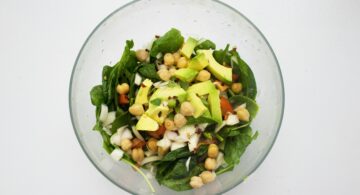7 Reasons Your Gut Will Love Probiotic Rich Kefir
Kefir – Great Health in a Glass!
Kefir is a fermented milk drink originating untold centuries ago. Before refrigeration, fermentation was a common method of food preservation. But as we’ll see, the fermentation process has far more to offer than mere preservation. The word “kefir” comes from the Russian language and means “pleasure drink.”
Most kefir is made from cow, goat, or sheep milk, but you can also make it from coconut milk or even water. The process for fermenting milk involves placing kefir “grains” in a jar and then adding milk and letting it ferment over a period of hours. Kefir “grains” are not grains in the conventional sense, but consist of a complex mixture of good bacteria that work as a starter. These “grains” look like small cauliflower florets and can be used repeatedly.
Kefir tastes similar to Greek yogurt, but has a more fluid consistency so that it’s drinkable. Although many people drink kefir plain, you can add natural sweeteners like honey or maple syrup, or mix in fruit as you might with yogurt. You can also make a delicious smoothie with kefir, but more about that later.
Why Kefir Is So Healthy
Kefir is one of the most probiotic foods on earth, containing 29 different strains of good bacteria.
Why is this so important? Over 75 percent of our immune system is in our gut.[1] As the gut flora goes in our digestive tract, so goes our health.
Kefir is also loaded with important vitamins and minerals including:- Vitamins A, B2, B6, C, D, E, K2 and thiamin
- Calcium
- Magnesium
- Phosphorus
- Riboflavin
- Iron
- Potassium
- Copper
- Zinc
7 Benefits from Drinking Kefir
- Creates a healthy immune system. As we’ve already mentioned, good bacteria are crucial to a healthy immune system. Kefir “cleanses” the digestive tract and provides a healthy balance of the probiotics that you need to stay healthy. As such, kefir has been used to help patients suffering from AIDS, chronic fatigue syndrome, herpes and cancer.[2]
- Relieves intestinal disorders. Due to the healthy probiotics in kefir, regular use can help eliminate irritable bowel syndrome, diarrhea, constipation, and leaky gut syndrome.[3] Kefir also allows the body to digest lactose, relieving symptoms of those who suffer from lactose intolerance. Once again, kefir is a champion when it comes to creating a healthy microcosm in your digestive tract.
- Assists with weight-loss. When your gut flora is out of balance, you’re more prone to weight gain. This is because your body is unable to absorb the nutrients it needs. As a result, you may be full, but your body still craves food because it’s being starved of these vital nutrients. Kefir helps get your digestive tract running on all eight cylinders. You’ll be able to absorb the nutrients you need and feel satisfied sooner.[4]
- Helps maintain blood sugar levels. If you suffer with type 2 diabetes, kefir may help you manage your blood sugar levels. Kefir’s probiotics feed on sugar. So kefir lowers excess sugar in your gut before it gets into your bloodstream. By the way, this is not just theory, but has been demonstrated in a controlled study. The study concluded: “Probiotic fermented milk [kefir] can be useful as … therapy in the treatment of diabetes.”[5]
- Kills pathogenic bacteria and fungi. Kefir produces lactic acid that is an antimicrobial agent powerful enough to eliminate bacterial and fungal strains. These include: salmonella, various strains of streptococcus, shigella, proteus vulgaris, helicobacter, candida and others.[6]
- Relieves the effects of allergies and asthma. Once again, it all goes back to the gut! Kefir provides healthy intestinal gut flora that have powerful anti-inflammatory properties.[7] Many people who are lactose intolerant are able to drink kefir. However, if you are lactose intolerant, speak with your doctor before trying kefir milk, or try kefir coconut water or kefir water.
- Increases bone density. This has to do with the fact that the probiotics provided by kefir allow the body to absorb the necessary bone-building materials: calcium and magnesium.[8] Kefir is also an important source of vitamin K2, which plays a vital role in metabolizing calcium. Vitamin K2 has been shown to significantly reduce the risk of bone fractures.[9]
How to Make Kefir
You can buy ready-to-drink kefir, but homemade is always better and it’s so easy! Making kefir requires a starter culture or “grains” consisting of live, active yeast that creates the beneficial good bacteria. You can buy starter cultures online, in the organic section of your grocery store, or at a natural foods store.
Here’s how easy it is to make kefir milk:
Ingredients
- 1 tablespoon of kefir grains
- 2 cups of organic whole, or raw milk at room temperature
Directions
- Pour milk into a jar leaving about an inch at the top.
- Mix kefir grains into milk.
- Cover jar with a clean towel or lid and set in a dark, dry place at room temperature.
- Check the kefir after about 12 hours. (Depending on conditions, it may take longer or shorter.) When it looks clumpy, it’s ready. The longer it ferments, the tangier the taste will be.
- Strain off the liquid and put the kefir grains in a jar and start over again.
Variations of Milk Kefir
You can do all kinds of things to add flavor and nutrition to your kefir. Milk kefir is not naturally sweet, but you can add:[10]
- 1 tsp. unrefined flax seed oil
- Natural sweeteners such as honey or maple syrup
- Spices like: cinnamon, nutmeg, or vanilla
- Fresh or frozen organic fruits: strawberries, raspberries, banana, kiwi, mango, etc.
- Other flavors or spices you’d like to experiment with
Other Healthy Applications of Milk Kefir[11], [12]
- Use kefir as a starter for sourdough bread.
- Substitute kefir for any recipe calling for buttermilk (pancakes, waffles, etc.).
- Use milk kefir as a base for soups, gravy, stews and salad dressings.
- Substitute kefir for recipes that call for sour cream, heavy cream or yogurt.
- Fortify mashed potatoes, casseroles, soups and more with kefir.
Coconut Kefir
Coconut kefir is made the same way as milk kefir. Start with organic coconut milk and follow the same process above. Coconut kefir tastes sweeter than milk kefir and actually begins to carbonate as it ferments. Coconut kefir has the same probiotic benefits as milk kefir, but is not as versatile in cooking.[13]
Water Kefir Recipe
Water kefir grains are called kefir crystals and are different from milk kefir grains. Water kefir crystals thrive on sugars rather than lactose. So with water kefir, you must add sugar or fruit juice. Water kefir has a milder taste than milk kefir and is not a good substitute in recipes because it lacks the tartness and consistency of milk kefir. Here is a water kefir recipe:[14]
Ingredients
- 2-4 tablespoons of water kefir crystals
- 4 cups filtered water room temperature
- 4 tablespoons cane sugar (white, brown, sucanat or raw)
Directions
- Add the water to a glass jar.
- Stir in cane sugar until dissolved. (Some sugars may require heating the water to get them dissolved. If you heat the water, be sure to wait until it is room temperature before adding the crystals.)
- Add water kefir grains.
- Cover jar with a clean cloth and secure with a rubber band.
- Let sit on counter for 2-3 days until mixture becomes slightly cloudy and bubbly. It will have a mild sweet taste, but not as sweet as sugar water.
- Strain off the water kefir and put the water kefir crystals in a new sugar mixture.
- Your water kefir is ready to drink. Add lemon for flavor if so desired.
Go to Amazon.com and type in “kefir grains” for a wide selection of kefir cultures online.
Kefir milk is a highly nutritious, super probiotic that can help you get your immune system dialed in and functioning optimally. And with so many other health benefits, kefir milk is definitely something you’ll want to try!


























